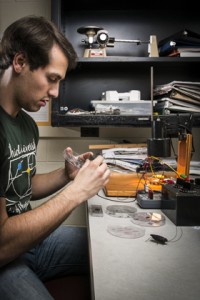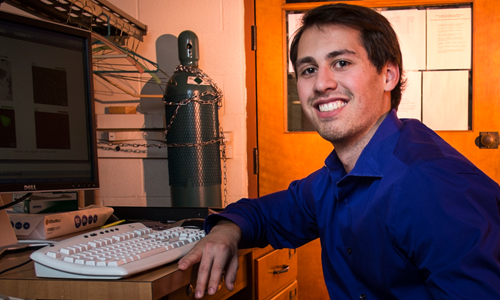By Jean Andrews
Physics & Astronomy
Austin Way ’14, an Honors Tutorial College student who majored in Engineering Physics, received a prestigious graduate research fellowship from the National Science Foundation.
The award includes three years of full support for graduate study during a five-year period, for the amount of $132,000. In addition, he has received a fourth year of full support from the University of Wisconsin-Madison, where he will pursue a Ph.D. in Material Sciences and Engineering.
“I’ll have a chance to study the growth of graphene and explore methods of applying graphene to different real-world problems under the direction of Dr. Michael Arnold, a leading researcher in the field,” Way says. “There’s a real possibility that I may become both a scientist and an inventor with the opportunity to write publications and patents.”

Senior Austin Way tests a solar cell’s open circuit voltage and short circuit current in order to calculate the efficiency.
Way’s professors have full confidence that Way has the qualities to take him far. “Austin was interested in solar cells from the first day I met him. He is well organized, articulate, and an excellent student. He is enthusiastic and positive in the lab—he is always thinking about the experiment and finding ways to improve the process or get around obstacles,” says Dr. Martin Kordesch, Professor of Physics and Astronomy and Way’s honors thesis adviser.
Dr. Nancy Manring, Associate Professor of Political Science and Way’s environmental sustainability faculty mentor, adds, “Austin is a gregarious physicist with a true passion for promoting environmental sustainability. “ Manring is the principal investigator for the Kanawha Project, a multi-year environmental sustainability initiative at Ohio University.
“In my view, what sets Austin apart from many of his peers is his scientific and technological expertise combined with his superb communication skills, and pragmatic understanding of the social and political challenges associated with transitioning to an economy based on renewable energy,” she adds.
Way’s award is sponsored by the National Science Foundation Graduate Research Fellowship Program, which recognizes and supports outstanding graduate students in NSF-supported science, technology, engineering, and mathematics disciplines who are pursing research-based masters and doctoral degrees at accredited U.S. institutions. NSF received more than 14,000 applications for the 2014 competition, and made 2,000 fellowship award offers.
The fellowship program is part of the NSF commitment to developing the science and engineering workforce. For more than 60 years NSF has recognized the need to support training America’s most promising students as they pursue graduate studies in science and engineering.
“Graduate fellows are the country’s future leaders in fields within NSF’s mission. And they’re selected through NSF’s (competitive) Gold Standard Merit Review process. The program is unique because it focuses on individuals, not on projects. Fellows have the freedom to choose their project, their adviser, and the university that they attend. It’s a long-term investment in individuals based on their potential“, explains Gisele Muller-Parker, GRFP program director.
“Graduate fellows will make a difference wherever they are. The program is good for the fellows; it’s good science and for the nation.”
“His research on solar cells directly relates to our most urgent and challenging national and global concerns: climate change, resource shortages and human security,” adds Manring.




















Comments